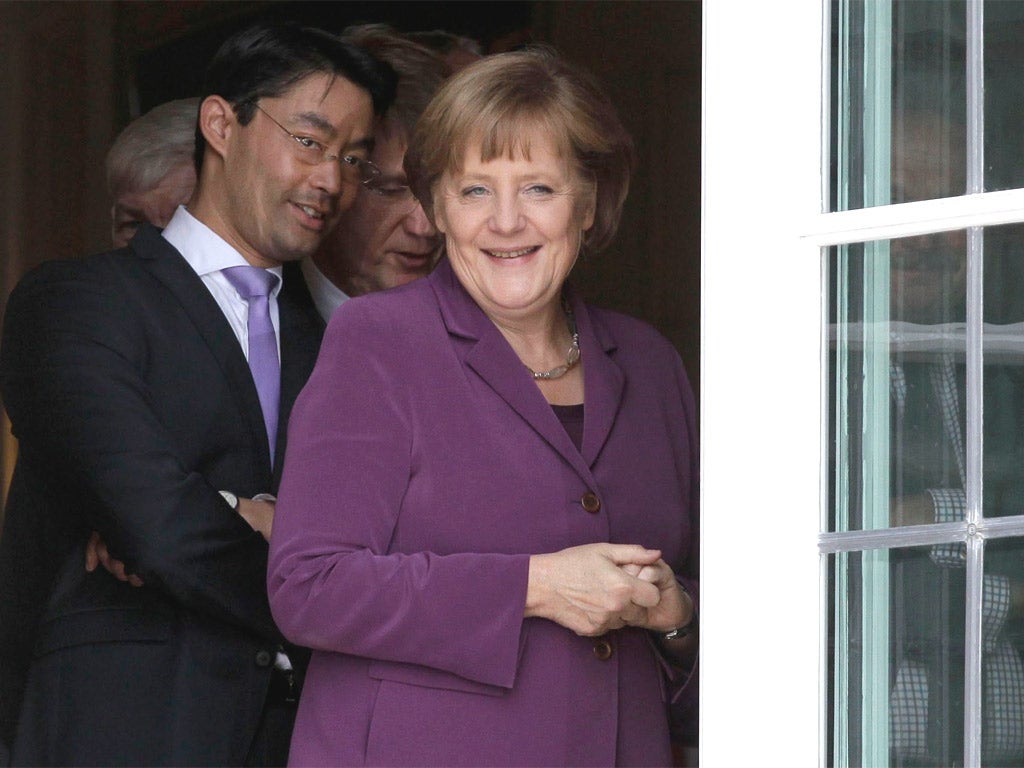Spain caves in to market pressure and asks Europe for bank bailout
German Chancellor urged to press ahead with plans for greater fiscal union to tackle crisis

Spain dropped its opposition to external funding and for the first time yesterday appealed to Europe for help in overcoming its worsening financial crisis, after Germany proposed a banking union to stabilise the Continent's economy and ease eurozone turmoil.
Madrid's call signalled a departure from the previous stance of Mariano Rajoy's conservative government, which had rejected the idea of external funding to assist the country in recapitalising its ailing banks because of fears that such a move would undermine market confidence in Spain.
Yesterday, however, Cristobal Montoro, the Treasury minister, appeared to break ranks with the Prime Minister when he made a direct appeal to European institutions to help to shore up the country's banks. "The door to the markets is not open to us at the moment," he said, in an admission that Spain's borrowing costs were too high. "The future of the euro is at stake."
He told the broadcaster Onda Cero: "The banks don't need excessive amounts to recapitalise. That's why it's so important that the European institutions open up and help us achieve, help facilitate that figure, because we are not talking about astronomical amounts."
Yesterday, finance ministers from the G7 group of industrialised nations held an emergency teleconference to discuss the crisis in which they backed German Chancellor Angela Merkel's proposals for a European banking union that would bring the Continent's major banks under greater central control. She also announced German plans to accompany austerity with measures to encourage European growth.
Before meeting the European Commission President, Jose Manuel Barroso, in Berlin on Monday night, Ms Merkel said that she would be discussing the possibility of putting major banks under supervision in Europe. "This is to make sure that national requirements do not play too great a role," she said.
Mr Barroso said a banking union with more integrated financial supervision and deposit guarantees was a "necessary step" which would consolidate monetary union with economic union. Europeans must do "whatever is necessary to ensure the stability of our currency", he insisted.
In Madrid, Mr Montoro also gave his backing to the idea of a European banking union as a means of safeguarding the single currency. Until yesterday, Spain had insisted that it did not need outside help despite estimates that its banks need up to €90bn (£73bn) in loans to survive the current crisis.
Germany was reported this week to have put pressure on Spain to accept funding from the European Stability Facility (ESF) to help it to solve its banking dilemma. Madrid's reluctance to accept ESF funding has caused its borrowing rates to soar. Last week, Spain was forced to offer 6.7 per cent interest rates on 10-year bonds – alarmingly close to the 7 per cent rate which forced Portugal and Ireland to accept ESF bailout funding in 2010 and 2011, respectively. Germany was also reported yesterday to be drawing up a comprehensive European-growth package. The Handelsblatt newspaper said the plan involved stocking up the capital reserves of the European Investment Bank with a cash injection of €10bn.
Spain by numbers
€27bn The amount being cut from Spain's most recent budget.
11 The number of days Spain's borrowing costs have been at least 5 percentage points higher than Germany's. Greece survived for 16 days without a bailout at the same threshold.
366,000 The number of people who have lost their jobs in Spain so far this year.
€19bn The bailout required to save Spanish bank Bankia from collapse.
62 per cent The fall in value of the benchmark Spanish stock market index, the Ibex, since 2007.
51.1 per cent The rate of unemployment among Spanish youths under the age of 25.
15 per cent The expected contraction in house prices over the next year.
9.8 per cent The amount by which retail sales fell year-on-year in April 2012.
Subscribe to Independent Premium to bookmark this article
Want to bookmark your favourite articles and stories to read or reference later? Start your Independent Premium subscription today.

Join our commenting forum
Join thought-provoking conversations, follow other Independent readers and see their replies